|
|
|
Sort Order |
|
|
|
Items / Page
|
|
|
|
|
|
|
| Srl | Item |
| 1 |
ID:
082683


|
|
|
|
|
| Publication |
2008.
|
| Summary/Abstract |
Whilst there has been a proliferation of research on the role of nationalism in the exclusion of asylum seekers, less attention has been paid to how nationalism can be mobilised in accounts opposing, rather than supporting, harsh anti-asylum seeker regimes. This paper compares the ways in which 'Australia' is constructed and used in parliamentary speeches on asylum seekers by both refugee advocates and those seeking harsher asylum seeker laws in Australia. This dual focus is particularly important as it highlights the flexibility of nationalist discourse, in that the same constructions of the nation may be used for both exclusive and inclusive purposes. Whilst typologies of inclusive and exclusive nationalisms, such as Smith's (1991) ethnic/civic typology, focus on the content of nationalist ideologies, we argue that the inclusivity or exclusivity of nationalism can best be determined by examining the subject positions, political solutions and social realities they make possible, and who these discourses benefit and oppress.
|
|
|
|
|
|
|
|
|
|
|
|
|
|
|
|
| 2 |
ID:
188027
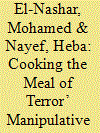

|
|
|
|
|
| Summary/Abstract |
This paper linguistically investigates terrorist discursive strategies designed to manipulate recipients’ minds into accepting, even embracing, certain ideologies. Though extensive research has been done on manipulative discourse used by journalists and politicians, examining the same discourse used by terrorists received comparatively scant attention. Under Critical Discourse Analysis, we employ a framework of analysis of ISIS discursive tools of manipulation, drawing on Reisigl and Wodak’s (2009) and Wodak’s (2011) discursive strategies, qualitatively and quantitatively analyzing (17) ISIS statements released between 2014 and 2016. We explore the discursive tools ISIS has characteristically used to manipulate its audience and legitimate and defend its actions. The aim is that once terrorist narrative is dissected from a different approach, such effort will be helpful in creating counter-narratives meant to reduce terrorism and vitiate its arguments. Emphasis will be laid on covert vs. overt manipulation, metaphorical dehumanization and metonymic depersonalization. We find that the data contained manipulative tools such as Captatio benevolentiae and volitive modality that are employed to project a positive image about ISIS.
|
|
|
|
|
|
|
|
|
|
|
|
|
|
|
|
| 3 |
ID:
079326
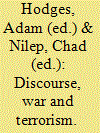

|
|
|
|
|
| Publication |
Amsterdam, John Benjamins Publishing Company, 2007.
|
| Description |
vi, 248p.Hbk
|
| Standard Number |
9789027227140
|
|
|
|
|
|
|
|
|
|
|
|
Copies: C:1/I:0,R:0,Q:0
Circulation
| Accession# | Call# | Current Location | Status | Policy | Location |
| 052654 | 909.831/HOD 052654 | Main | On Shelf | General | |
|
|
|
|
| 4 |
ID:
159900
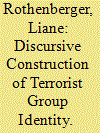

|
|
|
|
|
| Summary/Abstract |
The media coverage of terrorist acts has been the subject of numerous scientific studies. However, the terrorist groups’ own communication perspectives have not been thoroughly researched. The following article deals with terrorist groups and their use of websites for identity building. We examine the discursive construction of terrorist group identity through critical discourse analysis (CDA). The CDA of online texts from websites of terrorist groups is based on a five macro-strategy scheme. Our sample consists of six terrorist groups, with each group of two sharing different motivations: social-revolutionary, ethno-nationalist, or religious. All the groups analyzed are listed as terrorist organizations by the European Union. The CDA of 27 terrorist websites, purposively sampled, was conducted using two coders per site. Through this analysis, the researchers draw conclusions on strategies employed by terrorist organizations in building identity and how to counter their unregulated propaganda.
|
|
|
|
|
|
|
|
|
|
|
|
|
|
|
|
| 5 |
ID:
153649


|
|
|
|
|
| Summary/Abstract |
The present paper aims to analyse a number of those slogans collected from the sit-in quarters in Egypt, Libya and Yemen. Using political discourse analysis, it unravels various typical discourse structures and strategies that are used in slogans in the construction of a sub-genre of political discourse in the Arab world. Drawing data from several mediums, including banners, wall graffiti, audio-visual instruments, chanting, speeches and songs, this paper tries to show the extent to which the slogans serve as a medium by which political complaints and comments are dispensed and consumed. This paper draws on a rhetorical analysis to find out their persuasive effect on shaping the Arab intellect and on the change of the political atmosphere in the region. Lastly, this paper attempts to show to what extent the slogans meet the standards of political discourse and whether they can be considered as a sub-genre of political discourse or not.
|
|
|
|
|
|
|
|
|
|
|
|
|
|
|
|
| 6 |
ID:
087731
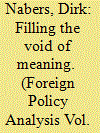

|
|
|
|
|
| Publication |
2009.
|
| Summary/Abstract |
The paper aims to shed light on the conceptual link between international crises such as the one following September 11, 2001, and processes of identity construction through foreign policy. Crisis and identity construction are conceptualized as constant political phenomena. The political process is constituted by meaningful acts of social agents, and can thus only be grasped by analyzing meaning. Meaning is transmitted by language. Meaningful language is never reducible to individual speakers; it is a social act. The sum of articulatory practices in a social field is called discourse. Linking Critical Discourse Analysis (CDA) with the theory of hegemony developed by Ernesto Laclau and Chantal Mouffe, I will be able to show how hegemonic discourses serve as the nexus between the discursive construction of crises and identity change. A number of problems will be acknowledged when linking these two strands of thinking, as CDA and Laclauian theory work with tentatively different conceptions of discourse. The construction of the "war on terror" by the Bush administration between September 2001 and May 2003 is used as a case to illustrate the theoretical argument.
|
|
|
|
|
|
|
|
|
|
|
|
|
|
|
|
| 7 |
ID:
192539


|
|
|
|
|
| Summary/Abstract |
China remains reluctant in claiming unilateral economic sanctions as a valid form of statecraft. China has consistently withheld official acknowledgment of its use of unilateral sanctions despite using them in different disputes. This has resulted to observations arguing that China is increasingly approaching the use of sanctions in a stealthier, therefore, more aggressive manner. It begs to ask, how does China’s reluctant attitude towards its use of unilateral economic sanctions fit into China’s overall foreign policy logic? More specifically, how does China’s victimhood discourse justify unilateral sanctions and at the same time, promote a positive identity of itself in light of coercion? This paper argues that China’s consistent vague acknowledgment and denial in claiming a direct hand on unilateral sanctions comes from its broad foreign policy objective of maintaining a positive identity through its discourse of victimhood. To uncover this understanding, this paper analyzes China’s official positions in six bilateral disputes where China has resorted to unilateral sanctions. While existing observations only stop at ‘plausible deniability’ as primary explanation for China’s vague rhetoric, analyzing China’s predication strategies provides a necessary nuancing in terms of how this peculiar behavior remains consistent with China’s overall foreign policy logic.
|
|
|
|
|
|
|
|
|
|
|
|
|
|
|
|
| 8 |
ID:
074965


|
|
|
|
|
| Publication |
2006.
|
| Summary/Abstract |
In this paper, I examine how Articulation Theory and Critical Discourse Analysis can be used to examine the Bush administration's 'Freedom Doctrine' as it appears in official speeches, press releases, and interviews. I also look at possible alternatives to the dominant militaristic interpretation of international events and foreign policy, and recommend other areas of research and study related to the Bush doctrine and the discursive practices that surround it. My overall argument, however, is that this particular doctrine has nothing to do with freedom, liberty, or justice as claimed by the Bush government. Rather, I argue that this doctrine is actually a veiled attempt to exert and extend America's economic, military, and political hegemony globally. We need a new approach to national security-a bold, progressive internationalism that stands in stark contrast to the too often belligerent and myopic unilateralism of the Bush Administration.(John F. Kerry)
|
|
|
|
|
|
|
|
|
|
|
|
|
|
|
|
| 9 |
ID:
187510
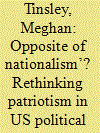

|
|
|
|
|
| Summary/Abstract |
Patriotism frequently is framed as an individualised expression of affinity for a civic polity and a counterweight to ethnocultural nationalism. Yet the term is invoked by theorists and practitioners to denote a broad, often contradictory range of values. This paper argues that this is not simply semantic slippage, but a reflection of the exclusionary character of patriotism. Taking as data the full range of speeches delivered at the 2016 Democratic and Republican National Conventions, alongside 180 campaign speeches delivered by Donald Trump and Hillary Clinton, I conduct a critical political discourse analysis. I find that invocations of ‘patriotism’ construct an in-group of citizens who are positioned as the heirs of an authentic national tradition, and an out-group of co-citizens who are attempting to hijack the national spirit. Further, despite its global aspirations, patriotism hardens the racialised distinction between citizens and non-citizens.
|
|
|
|
|
|
|
|
|
|
|
|
|
|
|
|
| 10 |
ID:
169453


|
|
|
|
|
| Summary/Abstract |
After Tony Blair resigned as the United Kingdom’s prime minister in June 2007, he was appointed as the official envoy of the Quartet on the Middle East. His appointment was marred with controversy not the least with regard to his suitability for the role and his performance as peace envoy, with many observers questioning his ethical credentials. The EU along with the US, Russia and the UN make up the Quartet and funded Blair’s office until 2012. With the US and the EU as the key regional players in this conflict, Blair became an embodiment of these players in this specific role. This article employs critical discourse analysis to nuance whether Tony Blair’s role as Middle East envoy, and as an embodiment of the EU, was indeed a legitimate one in terms of achieving at least some of its stated aims, particularly those pertaining to the Palestinians who live under Israel’s colonization. It does so by engaging with the work of John Street and more broadly the literature on celebrity politicians and by counterbalancing this conceptual framework with a critical reflection on Blair’s time as Middle East envoy.
|
|
|
|
|
|
|
|
|
|
|
|
|
|
|
|
| 11 |
ID:
169779
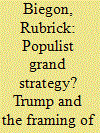

|
|
|
|
|
| Summary/Abstract |
What is the role of ‘populism’ in Donald Trump’s foreign policy? Defining populism as a framing style that constructs antagonisms around ‘the people’ and their adversaries, this article explores Trump’s rhetoric in relation to his efforts to shift US grand strategy away from its traditional investment in the liberal international order. Based on an approach grounded in the ontological commitments of critical discourse analysis, it examines three interlocking frames: (1) the ‘corrupt’ elites of the establishment ‘swamp’; (2) the anti-globalist, ‘America first’ agenda; and (3) poor deal-making responsible for the United States ‘losing’ in international affairs. In responding to declinist themes and anxieties, Trump’s populist rhetoric frames a Jacksonian ideological approach based on nationalism, mercantilism and a reliance on coercive power.
|
|
|
|
|
|
|
|
|
|
|
|
|
|
|
|
| 12 |
ID:
138910


|
|
|
|
|
| Summary/Abstract |
In this research, linguistics is applied to the study of novels through critical discourse analysis. Critical discourse analysts take into consideration those elements of discourse which are hidden in order to preserve power hierarchy. Clearly contrary to descriptive-formal surveys of language, they contend that language can be used intentionally in order to support dominance, inequality and struggle against them as well. The novel Modir-e Madreseh (The School Principal) by Jalal Al-e Ahmad is analyzed based on Theo Van Leeuwen's research indexes, namely activation and passivation, nomination and categorization, identification and functionalization, personalization and impersonalization. The analysis illustrates how examination of the linguistic form used in the novel leads to deeper knowledge of the author who tries to alleviate people's miseries while they themselves do not play any significant role in doing so.
|
|
|
|
|
|
|
|
|
|
|
|
|
|
|
|
| 13 |
ID:
168152


|
|
|
|
|
| Summary/Abstract |
The study adopts a critical discourse analysis approach to Chiang Kai-shek’s (CKS) internal nationalist propaganda and authoritarian discourse practices, investigating his New Year and National Day speeches in the 1950s. Authoritarian characteristics are evident in strategies such as legitimation, reification, or myth-making, in the antagonist categorisation of Self versus Other, in Self-glorification and the idolisation of the dead, in the hegemonic creation of commonality and unity, and in the metaphorical conceptualisation of reality. Patterns of idolising the dead serve to impose and legitimise CKS’s worldview among his citizens. Another pattern is CKS’s invention of imaginary compatriots within the “enslaved China” waiting for the best time to overthrow the “bandits’” rule. Reference to these imaginary agents indirectly presents to his audience a false but better impression of the Self, and a dimmer view of the communist bandits. A third pattern is CKS’s metaphorical use of language, such as references to communist China as a puppet regime of Russia.
|
|
|
|
|
|
|
|
|
|
|
|
|
|
|
|
| 14 |
ID:
174383
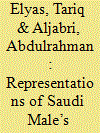

|
|
|
|
|
| Summary/Abstract |
There has been a tremendous interest in the Western media concerning the status of women in Saudi Arabia. The recent reform in women’s rights and guardianship system has Western media gone into motion frenzy. A few research has been done on the representation of Saudi women in Arabic newspapers, but there is a scarce of research in Western English newspapers to date. This article exercises a critical discourse analysis approach to investigate the language used in three famous Western newspapers to uncover the hidden ideologies behind the representation of Saudi women’s guardianship system. To this end, van Dijk’s (2004) analytical framework was employed to reveal the underlying ideologies of six reports by The Washington Post, The Guardian, and Toronto Star. The findings show that the three newspapers have expressed the notion of “otherness” in their descriptions of Saudi Arabia and Saudi women. Furthermore, the newspapers have shared the employment of consensus and negative other-presentation to portray Saudi women as being oppressed and subordinate.
|
|
|
|
|
|
|
|
|
|
|
|
|
|
|
|
| 15 |
ID:
167157


|
|
|
|
|
| Summary/Abstract |
This article explores explicit and implicit dimensions of identity that Negev Bedouin students position in their life stories. The literature review probes the participants’ historical, cultural and social contexts and presents the critical discourse-oriented perspective adopted in the study to explore identity construction in narrative discourse. Fourteen men and 16 women attending a college of education in southern Israel were asked to write meaningful stories related to various chapters in their lives. Interpretation of explicit themes and silences show that women and men positioned themselves as two separate groups vis-à-vis the male-dominated Bedouin tradition, and the Israeli government.
|
|
|
|
|
|
|
|
|
|
|
|
|
|
|
|
| 16 |
ID:
146534
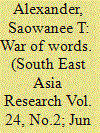

|
|
|
|
|
| Summary/Abstract |
Thai grassroots activists known as ‘redshirts’ (broadly aligned with former prime minister Thaksin Shinawatra) have been characterised according to their socio-economic profile, but despite pioneering works such as Buchanan (2013), Cohen (2012) and Ünaldi (2014), there is still much to learn about how ordinary redshirts voice their political stances. This article is based on a linguistic approach to discourse analysis and builds on Fairclough’s (2003) arguments concerning the ways in which speakers use intertextuality and assumption to construct social and political difference and consensus. It specifically explores redshirt understandings of democracy by examining intertextuality and presupposition through various linguistic strategies. It sets out to answer these questions: What are grassroots redshirt protesters’ understandings of democracy? How do they articulate those understandings verbally? The study is based on an analysis of 12 interviews conducted in 2012 with grassroots redshirts from Ubon Ratchathani, Thailand. It shows how informants voiced notions of democracy by making explicit intertextual references and alluding to implicit meaning through presupposition. The results show that informants had a definite understanding of democracy despite a degree of contradiction, confusion and ambiguity. They also attempted to communicate political beliefs despite limits on their freedom of expression.
|
|
|
|
|
|
|
|
|
|
|
|
|
|
|
|
|
|
|
|
|